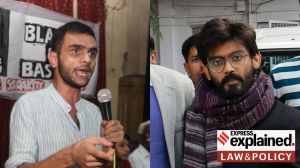Old Badal vs new Badal
Punjab Chief Minister Parkash Singh Badal8217;s censure to his young Finance Minister...

Punjab Chief Minister Parkash Singh Badal8217;s censure to his young Finance Minister, Manpreet Badal, where he was warned 8220;not to be irresponsible8221; and to refrain from earning 8220;brownie points by betraying people8221; has accentuated the ideological wedge evident in the Punjab Government today. The conflict is between old-world socialism and reformist capitalism 8212; represented by the 82-year-old Chief Minister and his 46-year-old nephew, respectively.
Last week, during a press interaction, Manpreet expressed his reservations against the high subsidy bills, being faced by Punjab. The very next day, an official note from the CM stated: 8220;Cabinet colleagues should refrain from making irresponsible statements8230; Every minister has to perform creditably within the ideological framework given by the party. I strongly disapprove of the tendency of saying one thing in campaign and then doing the opposite on coming to power.8221;
The CM8217;s reprimand and a categorical statement that 8220;subsidies are here to stay8221; have had the effect of silencing Manpreet, who was gradually building sentiments against the profligacy of subsidies. 8220;It would be inappropriate to comment. The Chief Minister is a political stalwart and a highly honourable man. If he has made some observations, I fully respect that,8221; Manpreet told The Indian Express.
It is worth noting that Manpreet was the Chief Minister8217;s choice for the post of the Finance Minister when the Akali Dal-BJP combine came to power. By appointing this Doon School and St Stephen8217;s College alumnus who went on to study law in London, the CM wanted to allay apprehensions that the Government would be apathetic to matters of finance. These fears were concomitant with Akali Dal due to its miserable past record in managing the state8217;s finances and the CM8217;s penchant for announcing subsidies. He had announced free electricity to farmers during his tenure of 1997-2002. The fact that his manifesto for 2007 promised many more sops heightened the fears of Punjab heading towards fiscal doom.
Soon it became evident that the Finance Minister wasn8217;t interested in merely being seen as a change agent for the Government. He called for and was successful in increasing revenue mobilisation. VAT collections at the end of this fiscal are targeted at Rs 7,000 crore, up from Rs 5,100 crore in 2007. Other taxes showed buoyancy too. But as he realised that in a landlocked and predominantly agricultural state, the avenues of new taxes were sparse, he started making a case against the subsidies. His main polemic was that people are not interested in mere sops, but in quality of service. For example, rather than having free power they would appreciate uninterrupted power with minimum fluctuations.
This is where his thinking came in conflict with the values of the CM. A man whose political career has spanned over five decades, Parkash Singh Badal feels that sops are integral for the welfare of people. 8220;This Government does not belong to the rich and powerful. It is the Government of farmers, small traders, shopkeepers, employees, poor, Dalits. I cannot betray them.8221; An old-world politician, several of his recent decisions were criticised by his own people for being antiquated. For instance, CM8217;s dictum that all official work shall henceforth be done only in Gurmukhi script Punjabi language was strongly resented by his own bureaucrats.
The differences in thinking manifest beyond subsidies too. Manpreet wasn8217;t very happy with the CM8217;s decision to de-seat Captain Amarinder Singh from the state Assembly. His argument was that this would lead to allegations of political vendetta and could give the oxygen of publicity to Amarinder. This was turned down by the Chief Minister, who was convinced that his predecessor needed to be taught a lesson as when in power he had initiated inquiries against the Badal family. Another recent example is that of unbundling the Punjab State Electricity Board PSEB. In a meeting held with the state8217;s top bureaucrats, Manpreet said that corruption and inefficiency in utility departments is leading to losses up to Rs 500 crore for the state and reform, including unbundling, is the call of hour. But within two days, the CM wrote a letter to Sushil Shinde, Union Minister of Power, citing the state8217;s unpreparedness for unbundling and seeking an extension in deadline. Similarly, a recent proposal to hike the bus fares in the state in view of hike in diesel prices met with disapproval from the CM because of the proximity of Lok Sabha elections. When in a subsequent meeting with Manpreet, the state Transport Minister offered the same argument, Manpreet reportedly shot back, 8220;You are a state politician. You are not contesting the Lok Sabha elections and your duty is to ensure that the transport is profitably run.8221;
The FM achieved a significant breakthrough when he gathered support for abolition of free power and re-introduction of octroi. By a relentless campaign he convinced Akali Dal legislators that the farmer is interested in quality power instead of free power. He went on to have a quid pro quo understanding with the BJP, where they gave him an assurance of not protesting the imposition of octroi, provided free power was abolished.
But now, the CM having categorically stated that subsidies will stay, Manpreet8217;s reform agenda has received a setback and he lives on to fight another day. Highly placed sources inform that in first week of November, when the finance ministers of all Indian states gather in Chandigarh for the next Empowered Committee meeting venue fixed by Manpreet, he will use the forum to address the problem of populism in state politics.
8220;The crorepati farmers of Punjab are using free power to run as many as 70 tubewells at the cost of the state exchequer. Ministers, babus and the CM are getting free power for their agricultural land. Such across-the-board benefits to crorepatis without targeting the intended group has taken the power subsidy bill to unsustainable levels,8221; says a spokesperson of PSEB Engineers Association.
Even the farmers, whose cause the CM has espoused, seem to understand the FM8217;s viewpoint. 8220;Normally subsidies are given to promote a new technology and Punjab farmers need capital subsidy so that they can build capacity and adopt new techniques,8221; says Dr G S Kalkat, chairman of Punjab Farmers8217; Commission.
- 01
- 02
- 03
- 04
- 05































